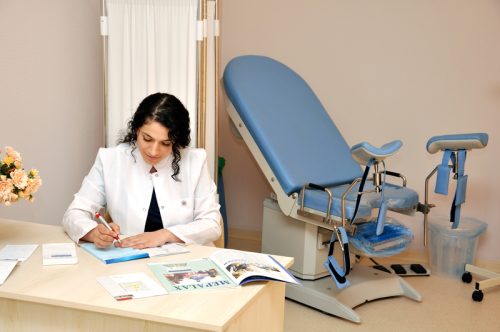Gynecology is the field of medicine related to women’s health, especially in relation to the female reproductive organs. Gynecology focuses on women’s health and related diseases, while obstetrics focuses on pregnancy care. The two fields are often lumped together or easily confused, but they are two different medical specialties. However, a doctor can specialize in both areas and become an Ob/GYN.
While it can sometimes be uncomfortable, gynecology is an important medical profession that provides comprehensive care to women of all ages. Its origins date back thousands of years before it became the modern medical field that it is today.
So why was gynecology invented? And what are the benefits of seeing a gynecologist in today’s modern world? Keep reading to learn more about this piece of the history of medicine, how gynecology helps women, and why you should see a gynecologist.
The History of Gynecology

The word “Gynecology” comes from Greek origins, meaning “the science of women.” It is said to have been established as a modern field of medicine around 1889. However, evidence of gynecological science can be traced back thousands of years to ancient Egypt, ancient Greeceи Ayurvedic medicine.
While there is a lot of dark history around the origins of American gynecology regarding a man named J. Marion Sims in the 19th century (known as ”the father of modern gynecology” although he performed unethical, experimental surgeries on enslaved Black women) — the modern field of gynecology helps women everywhere.
Important Women in the History of Gynecology

Despite being a male-dominated field for a long time, several notable women impacted the history of gynecology.
For instance, Metrodora was a woman in ancient Greece whose book, “On the Diseases and Cures of Women,” is the oldest known text written by a woman. Her medical writings were used by doctors for centuries, advising them on practices such as performing pelvic exams with a speculum and testing for STIs.
Another researcher and writer, Marie Stopes, published an informative resource titled “Wise Parenthood” in 1918. This resource educated women about contraception and fertility and was made widely available and free to the public.
And, of course, history cannot ignore the Black women who served as Dr. Sims’ subjects, such as Anarcha Westcott. While the nature of their participation in his medical experiments is unknown, the medical breakthroughs that resulted from their treatments served as essential contributions to medical science.
What Are the Benefits of Gynecology?

Gynecologists provide critical, life-saving health care to women of all ages. Gynecology has brought many medical breakthroughs and a better understanding of women’s bodies and health. Inventions such as the speculum help gynecologists examine the internal female anatomy for any concerning abnormalities or health issues.
Regular visits to a gynecologist will help you monitor your female health and wellness, better understand your reproductive system, and help you make informed decisions about your body. Building a strong, trusted medical relationship with your gynecologist can help keep you healthy and thriving throughout all stages of your life.
What Medical Services Do Gynecologists Provide?

In modern gynecology, gynecologists undergo extensive training in four years of medical school, and then they must also complete a four-year residency program. Gynecologists are board-certified medical practitioners. They provide a wide variety of essential women’s health services, including:
- Cancer screening including for cancers of the cervix, ovaries, uterus, and breast
- Birth control and contraception
- Physical examinations, including a pelvic exam
- Treatment for absent, painful, or heavy menstrual periods and cramps
- Fertility testing and fertility treatment
- Family planning assistance
- Виды УЗИ
- Pap smears
- Diagnosis and treatment of infection, such as vaginitis
- STI testing and treatment
- UTI testing and treatment
- Incontinence treatment
- Menopause treatment
- Prescription of medication
- Diagnosis and treatment of reproductive disorders, including endometriosis, ovarian cysts, pelvic pain, and more
- In some cases, on-site surgical treatment includes hysterectomies, tubal ligations, cyst removals, vesicovaginal fistulas, and more.
As you can see, gynecologists provide many essential, beneficial services for women that other doctors cannot. They are specially trained to be experts in the female anatomy and common reproductive health issues that women can experience throughout their lives.
When Should You See a Gynecologist?
It is generally recommended that young women around 15 book their first appointment to see a gynecologist. They may wish to start seeing a gynecologist earlier if they are sexually active or experiencing any issues with their hormones or menstrual cycles.
It is recommended that women over 21 see a gynecologist every one to two years. It is vital to be screened regularly for STIs, cancer, and other reproductive health issues.
As women age, regularly seeing a gynecologist is still essential, as they can help guide you through menopause and other hormonal changes associated with women’s aging.
Make an Appointment with a Gynecologist in New York City
At Great City Medical in NYC, we care deeply about providing comprehensive women’s health care and aim to eliminate any disparities in women’s care. Using modern techniques and best practices, Dr. Tsyba offers comprehensive and personalized gynecological care to her patients across NYC.
Looking for the best gynecologist in NYC? Call our offices to set up an appointment with our trusted medical professionals and take control of your women’s health and wellness today.
Dr. Tsyba is also a certified obstetrician and can provide additional women’s health care for those who are pregnant or planning a family.



